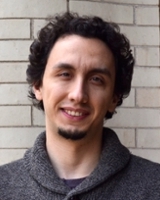2016-2017 Wimmer Faculty Fellows
We are pleased to announce the 2016-2017 Wimmer Faculty Fellows. These fellowships are made possible by a grant from the Wimmer Family Foundation and are designed for junior faculty members interested in enhancing their teaching through concentrated work designing or re-designing a course, innovating new materials, or exploring a new pedagogical approach. Fellows work in close collaboration with Eberly Center colleagues and receive a stipend to acknowledge the work it takes to improve one's effectiveness as an educator.
 |
Adam BjorndahlAssistant Professor |
Adam transformed his lecture-based course on game theory, the science of logical decision making, into an interactive experience where students played the games that they studied. Students actively engaged with important course concepts, rather than simply hearing about them in lectures. Playing the games helped students see the real-world applications of the math concepts on which the games were built. Additionally, the interactive nature of the games helped increase student engagement and motivation in the course.
 |
Clara BurkeAssistant Teaching Professor |
As a writing instructor, Clara aimed to show students that her “Business Communications” course wasn’t simply another (required) writing class, but rather an opportunity to expand their communications toolbox and develop as professionals. To accomplish this, she rewrote the learning objectives and developed new assignments aligned with these learning objectives. For example, to have students practice the skill of storytelling, they were asked to tell narratives about companies and data, in addition to the traditional personal narrative assignments like resumes and cover letters. Additionally, students were asked to retell their various stories for different audiences. Such assignments helped students develop their toolbox of professional communication skills and practice them in different, realistic contexts.
 |
B. Reeja JayanAssistant Professor |
Reeja incorporated active learning into her lecture-based course by using the game Minecraft to provide students a learning experience that is difficult to simulate in a laboratory. Reeja’s course provides mechanical engineering students with foundational knowledge in material science, and students learn this material best when they have the ability to test out different materials in particular environments and visualize structures at the molecular level. Given the limitations of lab space, the cost of materials, and other factors it is often difficult to students to conduct these experiments in a laboratory setting. Minecraft provided students an opportunity to conduct this type of experiential learning in a virtual environment. Analyses suggest that student learning was significantly greater when material was covered by Minecraft activities compared to traditional homework problem sets.
To see Reeja’s present her Wimmer project, including data from her analyses, click here.
 |
Limim JiaAssociate Research Professor |
To increase student engagement and learning, Limin redesigned several of her lectures using a flipped-classroom pedagogy. This pedagogy aims to replace lecture time with structured activities and assignments which allow students opportunities for practice and feedback with course material. Research has repeatedly shown that active learning techniques, such as the flipped classroom, lead to increased student engagement and comprehension of course material. Prior to class, Limin had students read articles and blog posts related to current information security cases (e.g., Target credit card leak), respond to questions pertaining to the readings, and then come to class and discuss these responses in small groups and as a full class. She found that her students were significantly more engaged with the course content during her “flipped” classes, and on their mid-semester surveys, students identified these class sessions as being the most beneficial to their learning.
 |
Kristin Letts KovakAssistant Teaching Professor |
In teaching her course “Drawing for Non-Majors,” Kristin noticed that students who were otherwise creative and innovative in their home discipline struggled to transfer those skills to the field of art. To address this problem, she redesigned the course to broaden students’ view of what constitutes creativity. Students practiced applying “methodologies for creative thinking” (e.g., analogical thinking, mind mapping, idea checklists) in class, and these activities helped prepare them for future assignments. Additionally, Kristin wanted students to feel more comfortable taking risks. To accomplish this goal, she structured several low-stakes, in-class activities, including small-group review of student work, rather than the standard high-stakes, full-class critique.